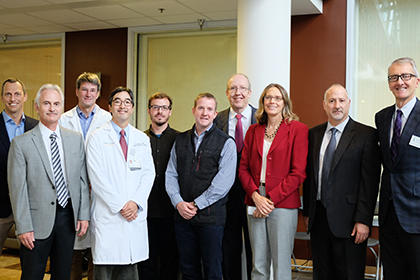The University of Vermont received $181.7 million in research funding during the 2020 fiscal year - the largest in UVM history by a wide margin. The Larner College of Medicine had the largest number of grants.

Microbiology and Molecular Genetics Chair Beth Kirkpatrick, M.D. (third from right) gathers with UVM leaders and colleagues at the announcement of the Translational Global Infectious Disease Research Center grant. (Photo: Medical Communications)
The University of Vermont received $181.7 million in research funding during the 2020 fiscal year, surpassing last year’s amount by $37.4 million, or 26 percent.
The total is the largest in UVM history by a wide margin, eclipsing the previous high of $146 million set in 2010, when extra stimulus funding was available to colleges and universities for their research efforts.
The Larner College of Medicine had the largest number of grants, but research awards were spread across many colleges and schools, including the College of Agriculture and Life Sciences, College of Arts and Sciences, Rubenstein School of Environment and Natural Resources, College of Engineering and Mathematical Sciences, College of Education and Social Services and College of Nursing and Health Sciences.
The surge in funding supports the research goals laid out in UVM’s recently released strategic vision, “Amplifying Our Impact.” Much of the new funding will enable UVM researchers to look for solutions that improve the health of society and the health of the environment, the two research areas prioritized in the vision, which the university is also investing in.
“In the increasingly competitive world of research funding, this new record is a remarkable achievement, a cause for celebration and a tribute to our faculty’s talent, passion and desire to make a difference,” said UVM president Suresh Garimella. “As someone whose research has benefited from many grants over the years, I know how much it means to have your work validated and supported so it can move ahead. We all look forward to the vital new knowledge our faculty will discover with the help of this funding and the impact it is sure to have on the many challenges confronting us.”
The number of awards increased overall to 680, up from 631 last year. About 80 percent of the funding came from the federal government, with the National Institutes of Health and the National Science Foundation awarding the most grants.
The university’s research success is directly attributable to the ability and hard work of the faculty and research staff, said Kirk Dombrowski, Ph.D., UVM’s vice president for research. “Many of our veteran faculty were again successful in bringing in large new awards,” he said. “We’re also seeing contributions from the talented scholars we’ve recruited in the past several years who are just beginning their careers.”
To help faculty succeed, the university has invested significantly in research administration, software and systems to streamline the grant writing process, Dombrowski said. The office also expanded its commitment to grant-writing and now has a team of five professionals who can assist faculty in developing proposals.
The 2020 totals benefit from special federal funding to address a crisis.UVM received $7.1 million in CARES funding last year.
The 2020 total included 39 awards of $1 million or more, including:
- $10.4 million from the Health Resources Services Administration in the U.S. Department of Health and Human Services to launch the Vermont Center on Rural Addiction. Principal investigator: Stacey Sigmon, Ph.D., associate professor of psychiatry.
- $8.4 million from the National Institute of Food Agriculture in the U.S. Department of Agriculture for sustainable agriculture research. Principal investigator: Vern Grubinger, Ph.D., extension professor.
- $2.5 million from the U.S. Department of Agriculture to establish the Food Systems Research Center. Principal investigator: Jean Harvey, Ph.D., R.D., professor of nutrition and food sciences and associate dean, College of Agriculture and Life Sciences.
- $2.2 million from the National Institute of General Medical Sciences in the National Institutes of Health to establish the Translational Global Infectious Diseases Research Center. Principal investigator: Beth Kirkpatrick, M.D., professor and chair of microbiology and molecular genetics, professor of medicine and director, Vaccine Testing Center. (Story on earlier grant for center is here.)
- $1.95 million from the U.S. Forest Service for the Northeastern States Research Cooperative 2.0. Principal investigator: Breck Bowden, Ph.D., professor for watershed science and planning.
- $1.7 million from the National Cancer Institute of NIH for research on the Structure and Function of DNA Repair Enzymes and Cancer. Principal investigator: Sylvie Doublie, Ph.D., professor of microbiology and molecular genetics.
- $1.7 million from National Institute on Drug Abuse in NIH for 2019-21 ABCD-UVM Consortium: Research Project Site at UVM. Principal investigator: Hugh Garavan, Ph.D., professor of psychiatry.
- $1.6 million from the U.S. Department of Energy for Packetized Energy. Principal investigator: Mads Almassalkhi, Ph.D., assistant professor of electrical and biomedical engineering.
- $1.2 million from National Cancer Institute in NIH for the Vermont Breast Cancer Molecular Characterization Laboratory. Principal investigator: Janet Stein, Ph.D., professor of biochemistry.
- $1.1 million from the Vermont Agency of Education for the Vermont I-Team. Principal investigator: Darren McIntyre, M.Ed., director of the Vermont I-Team and assistant director of the Center on Disability and Community Inclusion.
- $1 million from the Vermont Agency of Agriculture Food & Markets for UVM Extension Water Quality Improvement Activities. Principal investigator: Heather Darby, Ph.D., extension professor.